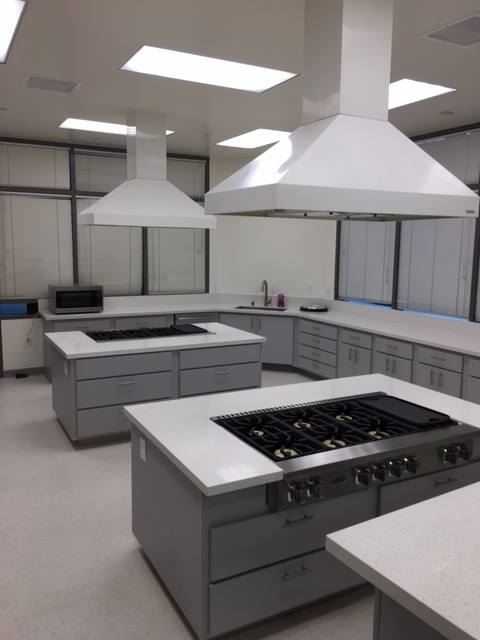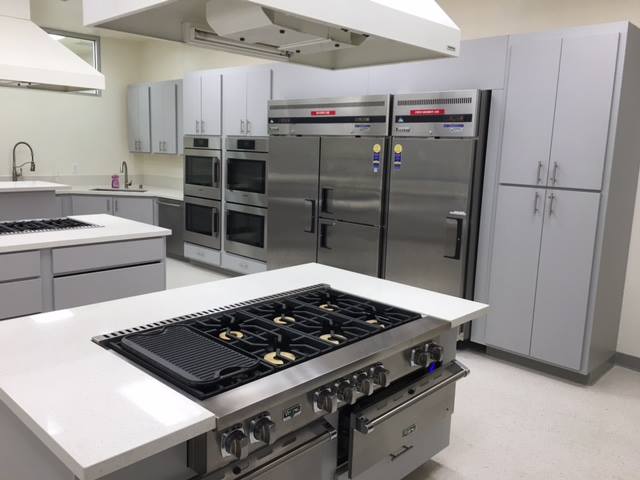Why does epoxy flooring work so well in the food business? Epoxy floors are the best when it comes to being safe for food.
When it comes to health and safety, the food and beverage industry leaves no room for error or complacency. Unsafe food could hurt people’s health in many ways, and it could also hurt the bottom line of the company, through fines, costly downtime, and damage to its reputation. Stringent standards are needed to make sure that food processing plants are in full compliance with all laws, starting with the floor.
Like many other industries, the food processing business has to follow rules set by the government. Maintenance managers in the food processing industry are responsible for making sure that the government’s health standards are met.
When making food, there are often leftovers that end up on the ground. Some examples are fatty acids, oils, blood, sugar, and even chemicals. In the food processing industry, it is important to keep the entire building clean, including the floor.
Get in touch with Diverse Technology Industrial Inc. by dialing +209 250 7828
right now for a free consultatioN.
Installing a certain type of floor coating is one way to protect the floor in the food processing industry and keep problems from happening. Many companies in the food processing industry use epoxy floors to make their facilities and their products cleaner and safer.
There is a good reason why epoxy flooring treatment is so prominent in the food industry. One reason is that it protects you from acids and alkalis. This kind of flooring solution is great for keeping your workplace clean and tidy because it sticks well and can handle harsh cleaning methods and chemicals.
To build a safe, reliable, and government-approved food processing factory, you must start with high-quality floors.
Why is Epoxy Flooring a Best Fit for the Food Industry?
Epoxy floors are the best as they provide high levels of safety, hygiene, durability, and longevity. Their smooth, seamless, and impermeable surface protects against all kinds of contaminants and is easy to clean to make sure the highest standards of cleanliness and food safety are met.
Food processing floor coatings come in many forms, such as self-leveling compounds, roll-ons, and epoxy screeds. All of these options create a smooth, completely waterproof surface. Epoxy also lets you make seamless coving between walls and floors, which makes it even harder for bacteria, mold, dirt, and dust to get into food and make it unsafe to eat.
Epoxies also have the advantage that they can be mixed with marble or silica to make a surface that doesn’t slip and slide. This can be helpful in places with a lot of water.
Epoxy resin floors that are 100% solid are a good choice because they are resistant to thermal and mechanical shocks and can withstand harsh cleaning methods like high-pressure hosing with hot water and cleaning products that are harsh and corrosive.
So, epoxy flooring is best for companies involved with:
- Processing meat, birds, and seafood
- Distilleries, wineries, cideries, and breweries
- Dry places where food is made
- Operations for bottling and canning
- Rooms for keeping things cold and frozen
- Places where fresh food is processed

Other Benefits of Epoxy Floor Coating for the Food Industry
1. Easy to Clean
Epoxy flooring is very easy to clean. This makes it a great choice for the food processing industries. Since it doesn’t have any cracks or crevices, the dirt of any kind, including dust, dirt, food, water, and any other kind, can’t get stuck on the surface. Unlike other flooring options like tile or wood, which would be almost impossible to clean given how much food could fall on them.
2. Water Resistant
Because it is waterproof, epoxy is a great material to use in factories that use things like food and liquids in their final products. Because of how epoxy flooring is made, any spills that would normally cause a water leak are easy to clean up. This is a great advantage over general flooring options. If your floor is made of wood or laminate and is prone to warping, a leak or spill at the wrong time could hamper productivity.
3. Durable
When the durability of epoxy flooring is compared to that of concrete, for example, we find that epoxy floor systems are three times as strong and are much less likely to get scratched or damaged.
Food processors can only have epoxy floor coatings because it is strong and lasts a long time.
4. Cost-Effectiveness
One of the most important things to think about when planning to floor a whole factory or building is how much it will cost. The effectiveness of the material should also be a top priority. When you look at the price per square foot, epoxy flooring is a much better deal than other options.
5. Epoxy Floor Systems are Safe
When running any kind of manufacturing facility, but especially one that makes food, safety is of the utmost importance. When there are that many people and machines on the ground level, accidents are almost certain to happen.
It is best to be well-prepared for any situation. Epoxy flooring is naturally sticky, which is a great way to keep people from slipping and falling.
Because of its affordability, durability, and a long list of other advantages, epoxy coating is the only option for food processing facilities.
If you are looking for epoxy flooring solutions, call Diverse Technology Industrial Inc. right away. You can count on us to ensure the safety and convenience of your facilities.
Get in touch with Diverse Technology Industrial Inc. by dialing +209 250 7828
right now for a free consultation.
Epoxy Flooring Solutions for the Food Industry
Epoxy coatings are very strong and won’t break even when there is a lot of traffic.
Usually, in a place where food is made, the floors have to be cleaned several times a day, and the place is usually hot and damp. Epoxy floors can’t be damaged by harsh cleaning with corrosive chemicals, and they’re also not affected by changes in temperature.
Floors also need to drain well so that water, cleaning fluids, oil, or food waste don’t build up and make the floor slippery or a place for bacteria to grow. Epoxy flooring solves this problem as well.
From an aesthetic point of view, epoxy flooring looks good, and it can be changed to include lines or different colors to mark areas like pedestrians, production, or restricted areas. Epoxy floors can also be made to match the corporate identity of a business.
Final Words
The food processing industry constantly needs to keep food safety at the forefront of its minds. They have a responsibility to ensure that all individuals who are involved in the processing and production of food comply with sanitary and safe food handling procedures.
Having manufacturing facilities that are equipped with epoxy floors can also make flooring more secure. Epoxy flooring is recommended for high-protection areas in food processing plants. These include sections designated for packaging, maintenance, and staff breaks, in addition to corridors, lobbies, and office spaces.
